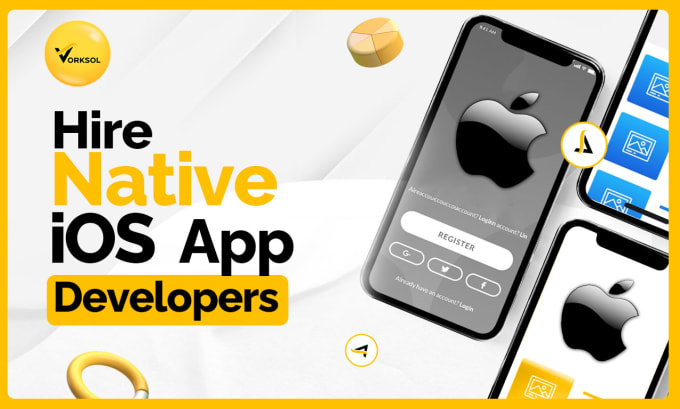In today's digital age, hiring a freelance iOS app developer can be a strategic move for businesses looking to create a dynamic and user-friendly mobile application. Freelancers offer flexibility, a wide range of skills, and often a cost-effective solution compared to traditional hiring methods. However, working with freelancers also comes with its own set of challenges. To ensure a successful partnership, here are some top tips for working with a freelance iOS app developer.
1. Clearly Define Your Project Scope
Before you even begin the search for a freelance iOS app developer, it's crucial to have a clear understanding of what you want to achieve. Define the project scope in detail, including:
- Objectives and Goals: What do you want your app to accomplish?
- Features and Functionalities: List all the essential features your app should have.
- Target Audience: Who will be using your app?
- Design and Aesthetics: What should the app look like? Provide design guidelines if possible.
- Timeline and Deadlines: When do you need the app to be completed?
Having a well-defined project scope will help you communicate your vision clearly to potential freelancers and avoid misunderstandings down the line.
2. Choose the Right Freelance Platform
There are numerous platforms where you can find freelance iOS developers, such as Upwork, Freelancer, Toptal, and Fiverr. Each platform has its own strengths and weaknesses, so choose one that best suits your needs. Look for developers with strong profiles, positive reviews, and relevant experience in iOS app development.
3. Evaluate Their Portfolio and
Experience
A freelancer's portfolio is a window into their capabilities and style. When reviewing portfolios, look for:
- Relevant Experience: Have they worked on projects similar to yours?
- Quality of Work: Are their previous apps well-designed and functional?
- Technical Skills: Do they have expertise in the specific technologies and tools required for your project?
Don’t hesitate to ask for references or case studies to get a better understanding of their past work and client satisfaction.
4. Conduct a Thorough Interview
Once you've shortlisted a few candidates, conduct detailed interviews to assess their suitability for your project. Some key questions to ask include:
- Technical Skills: What programming languages and frameworks are they proficient in?
- Problem-Solving Abilities: Can they provide examples of how they’ve overcome technical challenges in past projects?
- Communication Skills: How do they communicate progress and handle feedback?
- Availability: What is their availability, and how do they manage their time across multiple projects?
A good interview process will help you gauge not only their technical skills but also their ability to fit into your working style and culture.
5. Set Clear Expectations and Milestones
Once you've selected a freelancer, it's important to set clear expectations from the outset. Outline:
- Project Milestones: Break down the project into manageable phases with specific deliverables.
- Communication Plan: Decide on the frequency and mode of communication (e.g., weekly video calls, daily email updates).
- Feedback Mechanism: Establish a process for providing feedback and making revisions.
- Payment Terms: Agree on payment terms, whether it's hourly, per milestone, or a fixed price.
Having these details clearly documented in a contract will help avoid any misunderstandings and ensure both parties are on the same page.
6. Use Collaborative Tools
Effective collaboration is key to the success of any remote project. Utilize tools that facilitate communication, project management, and version control, such as:
- Project Management Tools: Trello, Asana, or Jira for tracking tasks and milestones.
- Communication Tools: Slack, Zoom, or Microsoft Teams for regular updates and meetings.
- Version Control Systems: GitHub or Bitbucket for code collaboration and version management.
- Design Tools: Figma or Sketch for sharing design files and feedback.
These tools can help streamline the workflow and keep everyone aligned throughout the project.
7. Foster Open Communication
Maintaining open and transparent communication is crucial when working with a freelance iOS app developer. Encourage regular updates and be responsive to any questions or concerns they might have. Constructive feedback is essential, but it’s equally important to acknowledge good work and celebrate milestones together.
8. Test Frequently and Thoroughly
Regular testing is vital to ensure the app is developing as expected and to catch any issues early. Conduct thorough testing at each milestone, including:
- Functional Testing: Ensure all features and functionalities are working correctly.
- Usability Testing: Check that the app is user-friendly and intuitive.
- Performance Testing: Verify the app's performance under different conditions and loads.
- Compatibility Testing: Test the app on various iOS devices and operating system versions.
Providing detailed feedback from these tests will help the developer make necessary adjustments promptly.
9. Plan for Post-Launch Support
Your relationship with the freelance developer shouldn't end once the app is launched. Discuss post-launch support and maintenance before starting the project. This could include:
- Bug Fixes: Addressing any issues that arise after launch.
- Updates: Implementing new features or updates based on user feedback.
- Technical Support:Providing assistance with any technical problems users might encounter.
Having a plan for ongoing support ensures your app remains functional and relevant.
10. Build a Long-Term Relationship
If you find a freelancer who delivers high-quality work and is easy to work with, consider building a long-term relationship. This can be beneficial for future projects and updates, as they already understand your business and requirements. Nurturing a good working relationship can lead to more seamless and efficient collaborations in the future.
Conclusion
Working with a freelance iOS app developer can be a highly rewarding experience if approached correctly. By clearly defining your project scope, choosing the right freelancer, setting clear expectations, and maintaining open communication, you can ensure a successful partnership. Remember, the key to a successful project is collaboration, transparency, and mutual respect. With these tips in mind, you'll be well on your way to creating a successful iOS app with the help of a talented freelance developer.









0 Comments